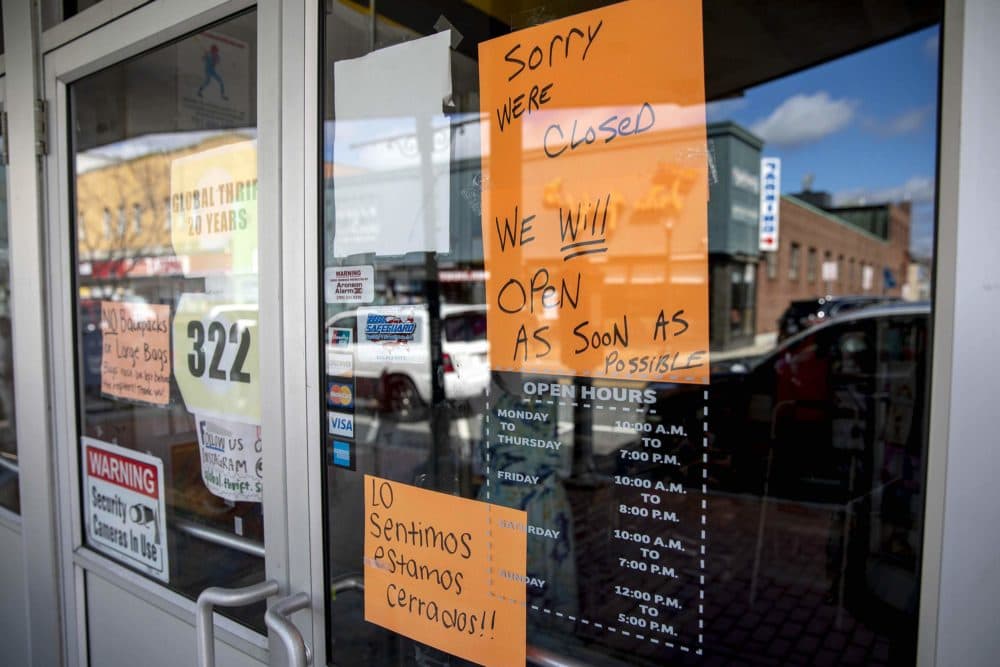Advertisement
Coronavirus Coverage
Getting Back To Business May Not Mean Business As Usual In Mass.
Resume
We're all wondering how we'll move forward when the coronavirus pandemic subsides. That includes Massachusetts Gov. Charlie Baker.
"We have had conversations with a variety of folks in our economic and health care communities, and in our public health community, about what life might look like once we get past this," Baker said at a recent news conference.
But the state is still at least two weeks away from allowing schools and nonessential businesses to reopen their doors. And life may continue to look different, even when that day comes.
"I don't think anyone's going to see a light switch go on and then, you know, all of a sudden you're going to see unlimited amounts of people out having dinner or out shopping," said Jon Hurst, president of the Retailers Association of Massachusetts.
Most of the group's 4,000 businesses are suffering and may continue to struggle, he said. He envisions lingering restrictions on retailers and restaurants — perhaps something akin to the current rule capping grocery stores at 40% of their usual capacity.
That's a state rule, which raises a question: Who will set the terms of an economic restart?
"I thought it was interesting to hear recently a kind of back and forth between the president and the governors about who is going to decide when the economy opens again," said Greg Bialecki, who was Massachusetts' secretary of housing and economic development in the years after the Great Recession. "The truth is it's neither of them."
Regardless of what policymakers allow, Bialecki said, the real test will be what consumers are comfortable with. He thinks some behaviors may be changing for good while people are cooped up.
"Everybody's been buying streaming services," he said. "For health reasons, and just for consumer preference reasons, will people go back to watching movies in big movie theaters? We don't know for sure. There's going to be a lot of change and disruption in the medical industry. I think you're seeing the rise of telehealth, in a big way. I think that may be a permanent change."
Telehealth is having a moment because patients are avoiding — or are barred from — visiting their doctors, except in emergencies. Bialecki thinks many patients are discovering they don't need face-to-face visits as much as they might have thought.
Consumers in other industries may be reevaluating real-world experiences, too.
Sports fans surely miss packing Fenway Park and TD Garden, but Holy Cross sports economist Victor Matheson isn't convinced they'll flock back to stadiums right away, even when permitted to go.
"Entertainment is supposed to make us happy, and if we're spending the whole time worrying about the person two rows down who just sneezed, that doesn't make it an enjoyable experience," Matheson said. "And, if you can't enjoy yourself going out, there is no reason to go out."
Even before enjoyment, there's the cost to consider. Like sports, many other hard-hit business sectors — such as travel, dining and retail — rely heavily on people's disposable income.
If you're not among the half million Massachusetts residents who've lost jobs in recent weeks, you still may not feel like there's anything extra in the household budget, said Laura Gannon, who runs a small accounting firm in Chelmsford.
"What you really need to be doing is paying your bills, making sure you're paying your mortgage and your rent and food," Gannon said. "Those are the priorities right now. We're in very uncertain times. I don't think people have extra money right now."
U.S. consumer confidence declined sharply last month and appears likely to fall again in April.
For Massachusetts leaders, a key to rebuilding confidence — and rejuvenating the state economy — may be resisting pressure to lift restrictions too soon, said former lieutenant governor Tim Murray.
"The question is: How do you open things up incrementally so that you don't create a second, across-the-state shutdown?" he said.
Murray worries a false start — in which businesses reopen, only to close again — could do more damage than being patient now. Though he and former Governor Deval Patrick successfully campaigned against Gov. Baker a decade ago, Murray said he believes the Baker administration will make sound decisions.
This segment aired on April 21, 2020.
